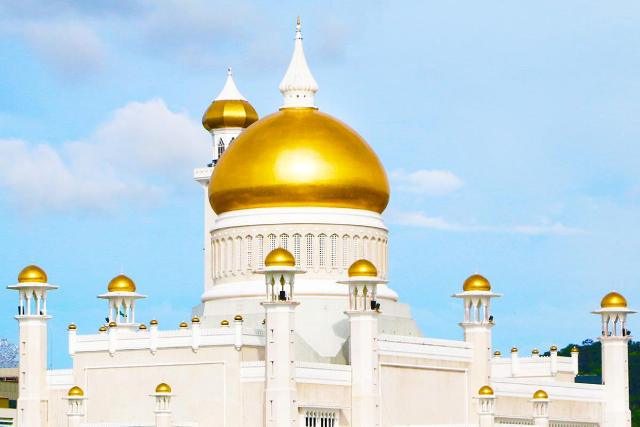 Omar 'Ali Saifuddien Mosque [photo: Brunei Tourism Board]
Omar 'Ali Saifuddien Mosque [photo: Brunei Tourism Board]
The enactment of sharia on April 3 was widely condemned and sparked demands for the south-east Asian nation to be suspended from the Commonwealth. Though the introduction of stoning to death for adultery and gay sex was met with particular outrage, the penal code also stipulates the death penalty for rape, robbery, apostasy, criticising Islam and insulting the prophet Muhammad. The imposes public flogging as punishment for abortion or lesbian sex, as well as amputation for theft, and criminalises exposing Muslim children to the beliefs of any other religion. The sale of alcohol is banned. Sharia also applies to non-Muslims, who make up a third of Brunei’s population; they are banned from using 19 ‘Islamic’ words, including Allah. Brunei, which is the first country in the region to implement sharia, is classified by the pressure group OpenDoors as one of the Commonwealth members where Christians most face persecution.
Amnesty International said: ‘To legalize such cruel and inhuman penalties is appalling.’ Human Rights Watch said imposing ‘archaic punishments for acts that shouldn’t even be crimes [is] barbaric’. The adoption of sharia prompted of luxury hotels owned by the sultan of Brunei, Hassanal Bolkiah. Writing in Deadline, the actor and human rights activist said that to fight ‘murderous regimes’ one had to ‘shame the banks, the financiers and the institutions that do business with them’. The boycott soon picked up momentum; the British government, which provides troops to the sultanate, criticised adopting sharia and Penny Mordaunt, then international development secretary, called its anti-gay stance ‘barbaric’. The shadow foreign secretary, Labour’s Emily Thornberry, said ‘unless the sultan changes these laws, [Brunei] should be suspended from the Commonwealth.’ Though a previous boycott when sharia was partly introduced in 2014 fizzled out, the outcry rippled beyond celebrities this time as banks including Morgan Stanley, Deutsche, Citi and Nomura banned staff from using the hotels. Most of the hotels had to suspend their social media accounts, Brunei’s national airline was shunned and the sultan’s other investments came under scrutiny.
Brunei responded by asserting its sovereignty and promising to ‘protect the legitimate rights of all individuals’. Following demands in the European parliament for EU asset freezes and visa bans, Brunei wrote to MEPs demanding ‘tolerance, respect and understanding’. Eventually, the beleaguered sultan declared that a death penalty moratorium that has existed since 1957 would apply to sharia offences. The Commonwealth secretary-general, Patricia Scotland, welcomed the move; LGBT activists said the religious penal code needed to be repealed.
Domestic criticism has become even more muted than before. A pseudonymous article in the Nikkei Asian Review by a former Brunei journalist said: ‘Already repressive media laws were rendered even more restrictive, with journalists fearing accusations of blasphemy or lèse-majesté. Any person perceived as a threat to the state could already be jailed indefinitely without trial under the Internal Security Act.’
Bruneian citizens, denied a role in public affairs in the absolute monarchy, are compensated with free healthcare and education, no taxes and subsidised housing, rice and utilities. But the ruling family’s profligacy was creating problems even in 1998 and when oil prices halved in 2014, and Brunei’s revenue fell 70%, it could no longer cosset its population so generously. Religion has become a new way to pacify the public: in March Brunei’s religious affairs minister urged those hit by the downturn to look for a ‘spiritual cure’. The sultan also had to look elsewhere: as China invested some $6bn in the oil sector and infrastructure in recent years, Luke Hunt in The Diplomat believes this bought Brunei’s silence over Beijing’s territorial ambitions in the South China Sea.
Elliot Brennan, writing for the Lowy Institute in 2014, gave three explanations for adopting sharia: the sultan wanted to shed his image as a philandering playboy; it allowed the government to stem growing dissent as youth unemployment, petty crime and methamphetamine use increased; and it might entice inward investment from the Islamic world as the stricken petro-economy sank under the weight of subsidies.
CNN said sharia ‘seems at odds with the lifestyles the sultan and his brother Prince Jefri Bolkiah are alleged to have lived. During the 1980s and 1990s, they had a reputation for throwing lavish parties, going on multimillion-dollar spending sprees, and running a “harem” at their palace.’ Vanity Fair described the brothers as ‘constant companions in hedonism’, though they who fell out some years ago over Jefri’s alleged embezzlement of $40bn in state funds while finance minister. The pair own about 500 Rolls-Royces among their 2,000 luxury cars. Gillian Lauren, in her account of being one of Jefri’s many girlfriends, claimed she had committed at least two offences under sharia with the sultan himself.
Bridget Welsh, politics professor at John Cabot University, said: ‘The sultan of Brunei and his brother Prince Jefri were known for their harems, their excesses in terms of purchasing of cars, their sexual exploits.’ Sharia, she said, was part of a ‘deeper rationale of controlling the state’ to ‘legitimize the exploitation of resources which he and his family have benefited from’.



